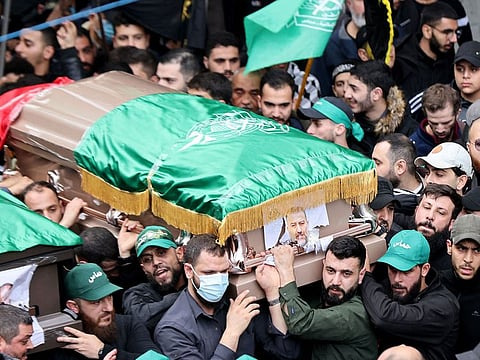Slain Hamas deputy chief Saleh Al Aruri buried in Palestinian camp in Beirut
Israel has neither confirmed nor denied that it assassinated Aruri

Beirut: The slain deputy chief of Hamas, Saleh Al Aruri, was buried in the Palestinian camp of Shatila in Beirut on Thursday, amid throngs of mourners launching volleys of gunfire.
Aruri was killed in a drone strike on Tuesday on the southern suburb of Beirut, a stronghold of allied Lebanese armed group Hezbollah, as he was meeting with a group of Palestinian and Lebanese men from factions allied to Hamas.
The attack was widely attributed to Hamas' sworn foe Israel.
Israel, which has laid waste to the Gaza Strip in a war aimed at wiping out Hamas that rules the enclave, has neither confirmed nor denied that it assassinated Aruri.
All seven people attending the meeting in Beirut were killed. The bodies of several, including Aruri, were blown into several parts by the strike, complicating preparations for the burial.
Two of the Palestinians - a member of Hamas's armed wing the Qassam Brigades and another Palestinian - who were killed alongside Aruri were also buried in Shatila Martyrs Cemetery that is the graveyard for Palestinians, including civilians, political officials and combatants.
"Palestine and Lebanon bid farewell today, along with the people of the nation, to strong men who fought battles in all fields and directions," said Hamas chief Ismail Haniyeh in a statement from outside Lebanon.
Their coffins were draped in Palestinian flags and carried by men wearing green caps with "Hamas" written on the front.
Heavy bursts of gunfire rang out for hours.
Aruri's death was the first targeted assassination of a Hamas official outside Palestinian territories since the Palestinian group's deadly assault in southern Israel on Oct. 7 that triggered Israel's onslaught on Gaza.
Analysts said it was also a message from Israel to Hezbollah that even its prime stronghold on the edge of Beirut could be reached.
Aruri, 57, was one of the founder of the Qassam Brigades before taking on a political portfolio in recent years.
Though less influential than Hamas' leaders in Gaza, Aruri was seen as a key player in the movement, masterminding its operations in the West Bank from exile in Syria, Turkey, Qatar and finally Lebanon after long stints in Israeli prisons.
He has been viewed as repairing the relationship between Hezbollah and Hamas after the two backed opposing sides in the Syrian war that erupted in 2011.
The head of Hezbollah, Sayyed Hassan Nasrallah, blamed Israel for Aruri's killing, saying on Wednesday that it was "a major, dangerous crime about which we cannot be silent".
Israel has long accused Aruri of lethal attacks on its citizens, but a Hamas official said he was also "at the heart of negotiations" over the outcome of the Gaza war and the release of hostages held by Hamas, conducted by Qatar and Egypt.
In Aruri's home village of Aroura, in the occupied West Bank, streets were adorned with Palestinian flags and banners celebrating him and dozens of people gathered in a hall near his family home to watch the funeral broadcast live.
"All the people of Aroura consider him as their son, also all the people of Palestine," Aruri's brother, Salameh Al Aruri, told Reuters.
Sign up for the Daily Briefing
Get the latest news and updates straight to your inbox



